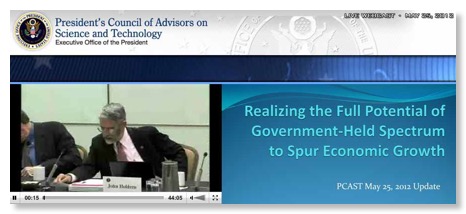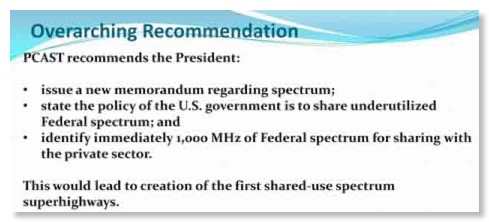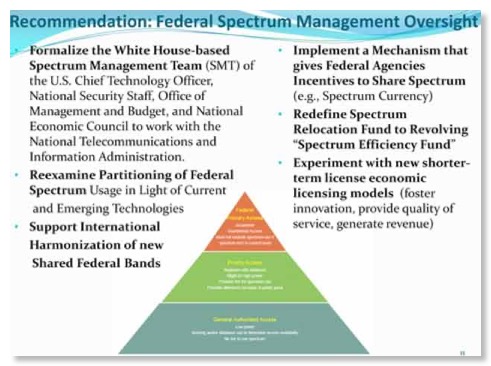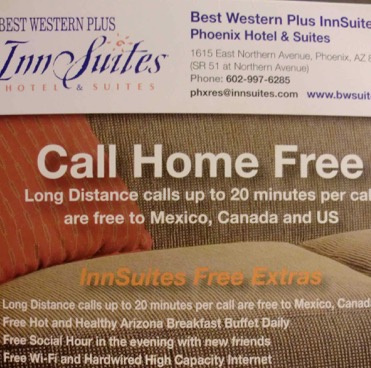White House Advisory Committee Recommends Major Changes to Federal Spectrum Use

At its May 25th meeting the President’s Council of Advisors on Science and Technology, a White House advisory committee of top technical experts, endorsed a report from a subcommittee entitled “Realizing the Full Potential of Government-Held Spectrum to Spur Economic Growth”. The text of of the report has not been released to the public pending final editing and delivery to the President. However, there was a presentation at the PCAST meeting and below are two “slides” from the presentation.
The first slide to be discussed is below:

Its second point is to “state the policy of the U.S. government is to share underutilized spectrum”. It is pretty clear that that is not the present policy. I recall that during the drafting of the Spectrum Policy Task Force Report the NTIA staff had a temper tantrum on even mentioning that “interruptible spectrum” sharing of low average utilization federal spectrum might be considered. All reference to the topic in the context of federal spectrum was scribed from the report!
IRAC traditionalists will also not be very pleased with the 3rd point on sharing 1000 MHz with the private sector. I hope the report indicates that this can not be resolved by sharing 97-98 GHz!
Clay T. "Tom" Whitehead

The report recommends creating a “White House-based Spectrum Management Team” of senior Administration officials to work with NTIA. This would be a move in the right direction to give real Silicon Vally-style “adult supervision” to IRAC - the group that makes most spectrum management decisions without much accountability to anyone.

The report also recognizes the at present agencies have no incentive to cooperate with sharing and to be early adopters of sharing concepts. Thus it proposes to reward such early adopters in the budget process.
The report seems very promising and we look forward to seeing the actual text. Hopefully it won’t get lost in election year politics.
Aaron Swartz keynote @ F2C2012: "How we stopped SOPA"
We usually don’t cover here Internet policy issues that do not specifically relate to spectrum issues, but when I went to the 2012 Freedom to Connect (F2C) conference this week to speak on the early days of Wi-Fi, I heard this great talk by Aaron Swartz on the challenges creates by SOPA and related legislation that at the moment are dead. I suppose he is loved by Hollywood as much as I am by NAB and CTIA.
It is a very interesting and dynamic presentation.
F2C is an interesting conference attended by both establishment types such as Vint Cerf and former FCC Comm. Copps and more grass root elements such as Aaron Swartz and conference founder David Isenberg.
Telecom Too Cheap to Meter

Long time readers of this blog may recall an early post on the rapidly declining cost of telecom within the memory of some of us. When I started working at FCC in September 1979 the cost of long distance rates was a major issue and the prime justification for the restructuring of AT&T and the telecom industry.
The “too cheap to meter” phrase come from an address by US Atomic Energy Commission Chairman Lewis L. Strauss to the National Association of Science Writers in New York on September 16, 1954 where he said, "It is not too much to expect that our children will enjoy in their homes electrical energy too cheap to meter.” The original context of this phrase is controversial and somewhat unclear. Our sister blog, Nuke Power Talk, has written today in more detail about the origins and controversy of Chmn. Strauss’ quote.
Last week we were in Phoenix for a family event and were surprised to see the flier shown above in the room. Rates for telephone calls from hotel rooms used to be a large issue at FCC and a source of many consumer complaints. This resulted in the adoption of Subpart O of Part 64 which did not solve the problem, but at least gave more information to the consumer. When I was in the Enforcement Bureau’s predecessor, a recurring activity was sending agents to hotels across the country to confirm that guests were given the information required by Part 64.
Free Wi-Fi has now become common at hotels although, oddly, expensive hotels often charge up to $20/night for Wi-Fi. One wonders why Motel 6 can give it away and $300/night hotels have to charge extra! An iPod with Skype installed and an under $20 microphone/earpiece attachment can convert a Wi-Fi signal to use for a telephone call. This is especially cost-effective when outside the US and calling home since international cellular calling rates suffer from a severe case of market failure and regulatory apathy in all countries. (In some countries, prepaid calling cards offer a cost-effective way to call home. But they may be hard to find and difficult to use for the language challenged.)
Free local calls has become a recurring feature at hotels in recent years. But the Phoenix hotel above is the first hotel I have seen with both free long distance and free calls to Canada and Mexico (as long as they are under 20 minutes). This is further confirmation that the marginal cost of landline telephone calls in the era of broadband is really “too cheap to meter”.
The economics of mobile communications are clearly very different from landline systems with higher fixed costs for spectrum procurement and base station construction. But the information rate of voice calls is getting to be a small fraction of the overall volume in bits of mobile networks and one wonders when the day will come when the mobile industry will also conclude that voice telecom is also “too cheap to meter”? That day is not yet here, but with the changes in technology and the mobile market it may come soon.
Spectrum Policy Issues in Wireless Education Programs

Spectrum policy issues can have a major impact on the practical aspects of which wireless technologies move from the pages of IEEE journal articles to operational systems. Just because technology “X” can be physically built to operate in frequency band “Y” does not mean that it can be practical in non-experimental use or within the professional career lives of those developing it. In all countries, for better or for worse , spectrum use is probably the most highly regulated technology of all the technologies within the IEEE community . Wireless regulations can have just as large an impact on system design as Maxwell’s Equations — although wireless regulations can be changed over time and Maxwellian constraints are more binding. Exposing wireless technology students to these issues is thus a valid goal in undergraduate and graduate programs in the wireless area.
The article reviews options for including spectrum policy issues in wireless education either as supplementary material in mainstream courses or as a stand alone course. Recently your blogger was invited to the University of Notre Dame’s Wireless Institute to explore this topic.
For the next month or two the article is available at the IEEE Wireless Communications website, after that it will be available on the IEEE Xplore site for a fee if you are not a subscriber.



![Validate my RSS feed [Valid RSS]](valid-rss-rogers.png)

